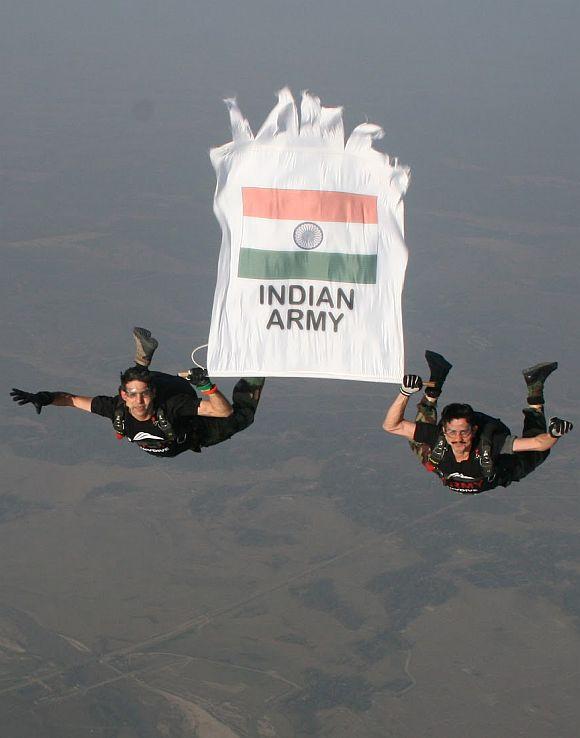
While there is a powerful social justice argument for reservations in education and employment for the marginalised scheduled casts/tribes and other backward classes, pro rata in the military has no such rationale, says Ajai Shukla
Promotion politics within the army is dividing a tight-knit fraternity.
That was evident from the bitterly polarised responses to my recent report in this newspaper on the reshuffle of the army's theatre commanders, the seven powerful generals who head the regional commands.
That reshuffle sidelined an outspoken general who opposed the army chief's ill-advised new promotion policy, which would have major generals selected on the basis of quotas reserved for each arm, rather than on merit alone.
This retrograde move, which could yet be shot down, needs explanation.
An "arm", in this context, is a component of the army that is distinguished by its function. For example, the armoured corps fights in tanks, the artillery operates long-range howitzers and guns, the signals provide the voice and data links, the engineers bridge rivers and breech minefields, while the infantry -- the most numerous arm -- comprises foot soldiers (except for the mechanised infantry, now a separate arm, which moves on the battlefield in armoured vehicles).
...
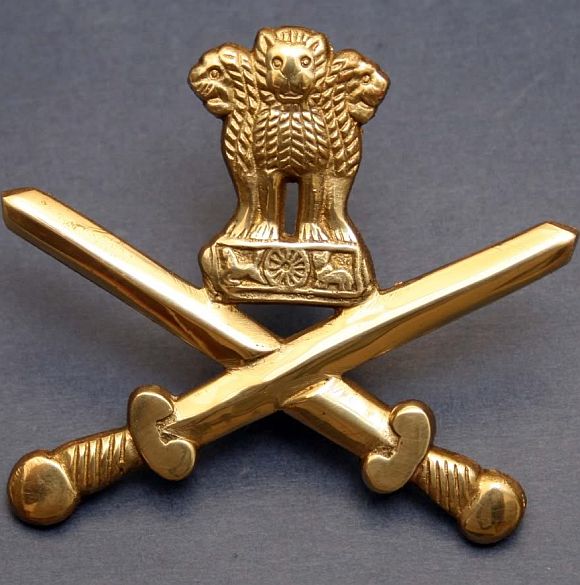
Each arm performs a crucial battlefield function, but its officers are trained to understand the battlefield in its entirety.
That is why the army's "general cadre" -- officers of the rank of brigadiers, major generals, lieutenant generals, and the apex of the pyramid, the army chief himself -- has always been selected from these arms based on merit, not reserved vacancies.
Over the last decade, this system has been subverted by the notion of reservations for each arm, authored by an unbroken succession of army chiefs from the two largest arms, infantry and artillery -- General N C Vij (infantry); General S Padmanabhan (artillery); General J J Singh (infantry); General Deepak Kapoor (artillery); General V K Singh (infantry); and now General Bikram Singh (infantry).
Employing the innocuous rubric of "pro rata" promotion, vacancies at the rank of brigadier were reserved for each arm according to its numerical strength, ensuring that most brigadier vacancies were reserved for the infantry and artillery.
...
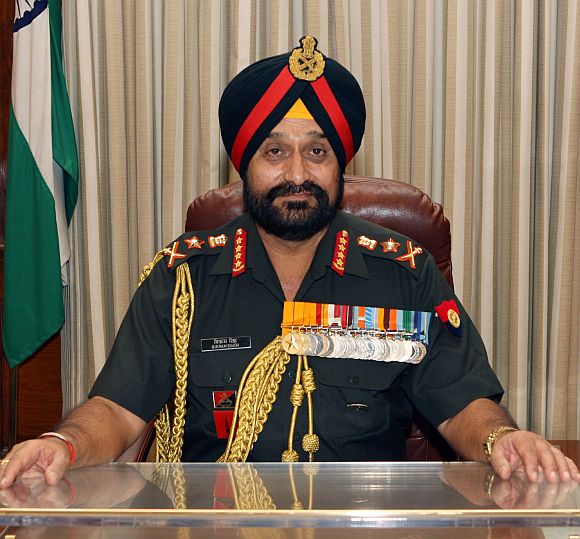
Now General Bikram Singh wants to extend this to the next higher rank as well -- that of major general.
These chiefs have so far managed to get away with this. Unlike other organisations, the army has no clear-cut promotion manual where selection criteria are written in stone.
Instead, army promotion policies exist in the form of multiple "policy letters", with each army chief issuing fresh amendments to benefit his constituencies -- usually his arm, but equally other interests.
Now pro rata promotion is creeping in. When pro rata was introduced for brigadier rank a decade ago, the policy letter promised a review of the policy later. Today, with no review having been done, a fresh policy letter seeks to extend pro rata to major general rank.
The defence ministry can veto this policy, but has chosen to enjoy the spectacle.
It has endorsed the army chief's sidelining of the army commander who steadfastly opposed pro rata.
The central army commander, Lieutenant General Anil Chait, who has been kicked upstairs, can only watch powerlessly from the backwaters of the Integrated Defence Staff.
...
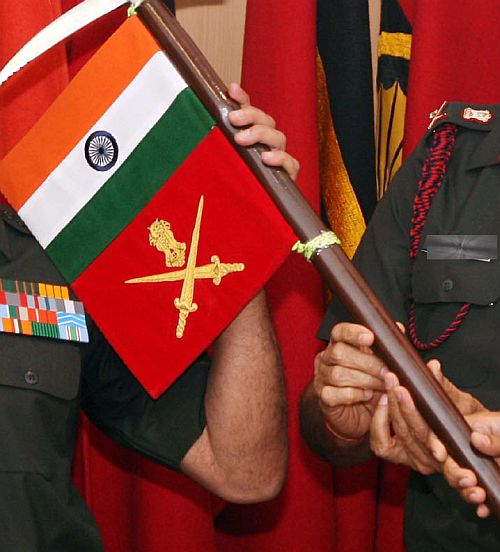
While there is a powerful social justice argument for reservations in education and employment for the marginalised scheduled casts/tribes and other backward classes, pro rata in the military has no such rationale.
It is designed to benefit the most influential sections of the army -- the infantry and the artillery -- which produce the most generals and almost all the army chiefs.
It is mystifying why generals from these dominant arms -- who quite openly disparage SC/ST and OBC reservations -- are being allowed to push reservations within the army.
That they are doing so suggests a lurking insecurity, which stems from the fact that other arms -- notably the armoured corps and the mechanised infantry -- have produced more generals than their tiny numbers would suggest (though far less in absolute terms than the infantry and artillery).
In the 1970s and 1980s, this was perceived to be because the best cadets at military academies opted to join those glamorous arms; and so the academies began allocating cadets equally across different arms.
...
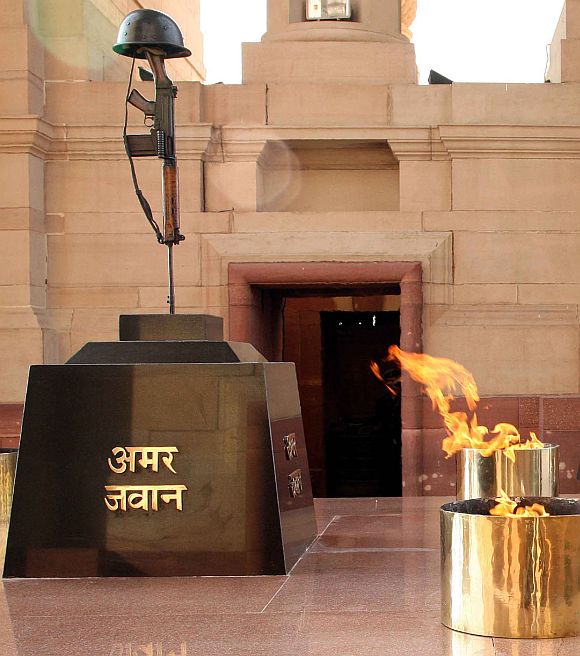
Thereafter, promotion fortunes have fluctuated randomly, which is how it should be. Sometimes there are more infantry brigadiers and generals; at other times the armoured corps garners a disproportionate share of vacancies. As long as merit and quality prevail, this is quite in order.
But the infantry and artillery want a guaranteed quota of vacancies through the myth that they serve in more operationally intense environments like J&K, while the others protect their careers in "sheltered" postings.
In fact, officers from all arms serve on cross attachment with infantry units, the Rashtriya Rifles, and formations deployed in counter-insurgency operations and high-altitude areas. The credits obtained from these deployments already boost a promotion candidate's profile when compared to a relatively mundane "peacetime" report, so reservations are a redundant benefit.
But the most dangerous fallout of this preoccupation with counter-insurgency is the shift of focus from the army's primary job -- warfighting.
If counter-insurgency, not warfighting, becomes the primary vehicle of professional advancement, the military will be setting itself up for another traumatic defeat in war.
Already there are signs of a "police mindset" -- with allegations of fake encounters, custodial killings and other unsavoury accusations that are associated more with the police than the army. It is time to refocus on warfighting, and the meritocratic selection of commanders who can win a war.
Click on NEXT to go further...
...